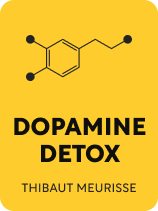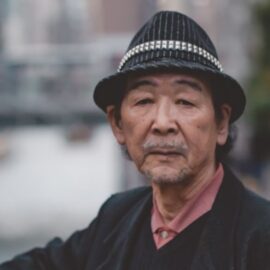

This article is an excerpt from the Shortform book guide to "Dopamine Detox" by Thibaut Meurisse. Shortform has the world's best summaries and analyses of books you should be reading.
Like this article? Sign up for a free trial here.
What is the Dopamine Detox book about? What are the main takeaways of the book?
In Dopamine Detox, Thibaut Meurisse claims that if your mind feels scattered and distracted, it might be time for a dopamine detox. He further explores the science of dopamine and what causes sensory overload in the brain.
Read below for a Dopamine Detox book overview.
Dopamine Detox by Thibaut Meurisse
In the Dopamine Detox book, Thibaut Meurisse argues that all of us suffer from a constant state of sensory overload that robs us of our focus and our ability to meet our full potential. The culprit—dopamine, the neurotransmitter released in anticipation of a pleasurable activity.
To reclaim your focus, Meurisse advocates for the power of a dopamine detox—the intentional elimination of activities that trigger dopamine and lead to sensory overload. He argues that by removing activities that trigger dopamine, you have the power to reclaim your capacity for the deep focus necessary to accomplish your long-term goals and dreams.
Thibaut Meurisse is a personal development coach and founder of the website What Is Personal Development. In addition to hosting his own YouTube channel, Meurisse has published over 20 self-improvement books. Dopamine Detox is the first book in Meurisse’s four-part Productivity Series.
Understanding Dopamine
Dopamine is a naturally occurring chemical often described as the “pleasure chemical,” but, according to Meurisse, this is a common misunderstanding. He explains that dopamine is the chemical cue for reward-seeking behavior. It’s the neurotransmitter that motivates you to seek out pleasurable experiences, not the chemical that causes you to feel pleasure.
Dopamine has played a critical role in human evolution, motivating people to focus their energy on pleasurable activities necessary for survival and reproduction, like eating food or having sex. However, Meurisse argues that dopamine no longer offers the same evolutionary benefit that it once did. The modern world is a media-saturated environment, full of passive entertainment, like social media or video games, which constantly trigger dopamine, offering minimal benefit and leading to sensory overload.
The Dark Side of Dopamine
Meurisse explains that in the modern world, companies use dopamine as a tool to steal your focus. As a consumer, your attention equals money, so companies like TikTok or Instagram are constantly competing for that attention. As you scroll through social media, the anticipation of receiving likes, comments, and other forms of social validation activates the reward centers in your brain, releasing dopamine. When you receive positive feedback, your brain associates the experience with pleasure and reinforces your desire to seek out more of it. This creates a cycle of reward-seeking behavior that can become addictive and prevent you from focusing on more important tasks.
The problem is that constantly seeking the next sensory input leads to sensory overload, which prevents you from focusing on the work that matters most. When you anticipate a pleasurable activity, dopamine is released. As more dopamine is released, your body needs an increased level of sensory input to release the same amount of dopamine. The impact, according to Meurisse, is that you’re left constantly looking for the next sensory input. Overstimulated, you become easily bored by low-stimulation activities (like focused work) and incapable of the deep focus necessary to accomplish your long-term goals.
The Dopamine Detox
Meurisse argues that the solution is a dopamine detox. A dopamine detox is the intentional elimination of activities that trigger dopamine to decrease sensory overload. This helps you regain control of your focus so you can spend your time on your most meaningful tasks.
Meurisse acknowledges that the term dopamine detox is a misnomer because it suggests that the problem is an overabundance of dopamine. In reality, he explains, the problem is that when you’re overloaded by external stimuli, the brain requires an increasing amount of sensory input to release the same amount of dopamine, so you’re no longer able to feel engaged or stimulated by the everyday meaningful tasks necessary to accomplish your long-term goals.
Meurisse outlines two models for a detox, the total detox and the limited detox.
The Total Detox
The total (or complete) detox requires you to remove all dopamine-inducing behaviors for 24 or 48 hours. Meurisse argues that this detox will reduce your level of stimulation.
The following activities are examples of dopamine-inducing behaviors to eliminate during your detox: browsing the internet, watching tv or movies, listening to music, using your phone, scrolling through social media, consuming drugs or alcohol, eating sugar or highly processed foods, and over-exercising.
Meurisse recommends engaging instead in low-stimulation activities like journaling, walking, gentle stretching, or meditation.
The Limited Detox
The limited (or partial) detox requires you to eliminate your most significant source of dopamine for an extended period of time. (Meurisse recommends a trial period of 30 days.) Your significant source of dopamine might be processed foods or a specific website or app, like YouTube. While the limited detox is less challenging than the total detox, it still decreases your external stimulation and allows you to take back control of your focus.
Strategies for Success
Regardless of which detox you choose, Meurisse offers a three-step process that will help you be more successful.
First, identify activities you find addictive. He recommends thinking about activities or behaviors that you can’t imagine going without. These are the behaviors most likely to cue your brain to release dopamine.
Second, create barriers that make your addictive activities harder to access. For example, leave your phone in another room or use focus apps that block distracting websites. You can also make it easier to engage in desirable behaviors. For example, if you want to focus on working out, leave your workout clothes and equipment out so you see them right when you wake up.
Third, start your day without stimulation. Meurisse recommends setting up a morning routine that prioritizes focus over external stimulation, setting the tone for the rest of the day. Come up with two or three activities that you can do immediately after waking up that help you focus.
After the Detox
For your detox to have a sustained impact on your life, you need to continue healthy habits after your detox ends.
Muerrisse acknowledges that it can be easy to fall back into old habits. He offers the following strategies to help avoid backsliding (or relapsing):
- Be kind to yourself. The world is designed for sensory overload, so know that you have an uphill battle ahead of you.
- Practice self-awareness so you can notice when you start to engage in old habits again.
- Cultivate present-mindedness through activities like mindfulness, stretching, walking, rich conversation, or even being bored.
Sustained Productivity
The ultimate goal of the dopamine detox is to increase your productivity so you can meet your long-term goals.
To sustain the benefits of the dopamine detox and increase your productivity, Meurisse argues that you must stay focused, be consistent, and prioritize the tasks that have the biggest impact on your long-term goals. One way to do this is by implementing a daily schedule. Every day, write down three to five tasks you want to complete. Number those tasks in order of importance. Start working on number one, only moving on to the next task when you’ve completed the first. He argues that a consistent daily schedule will help keep you on track and help you prioritize the most impactful tasks.

———End of Preview———
Like what you just read? Read the rest of the world's best book summary and analysis of Thibaut Meurisse's "Dopamine Detox" at Shortform.
Here's what you'll find in our full Dopamine Detox summary:
- Why society suffers from a constant state of sensory overload
- Why dopamine is to blame for our inability to focus and accomplish goals
- How to do a dopamine detox to regain the ability to focus






